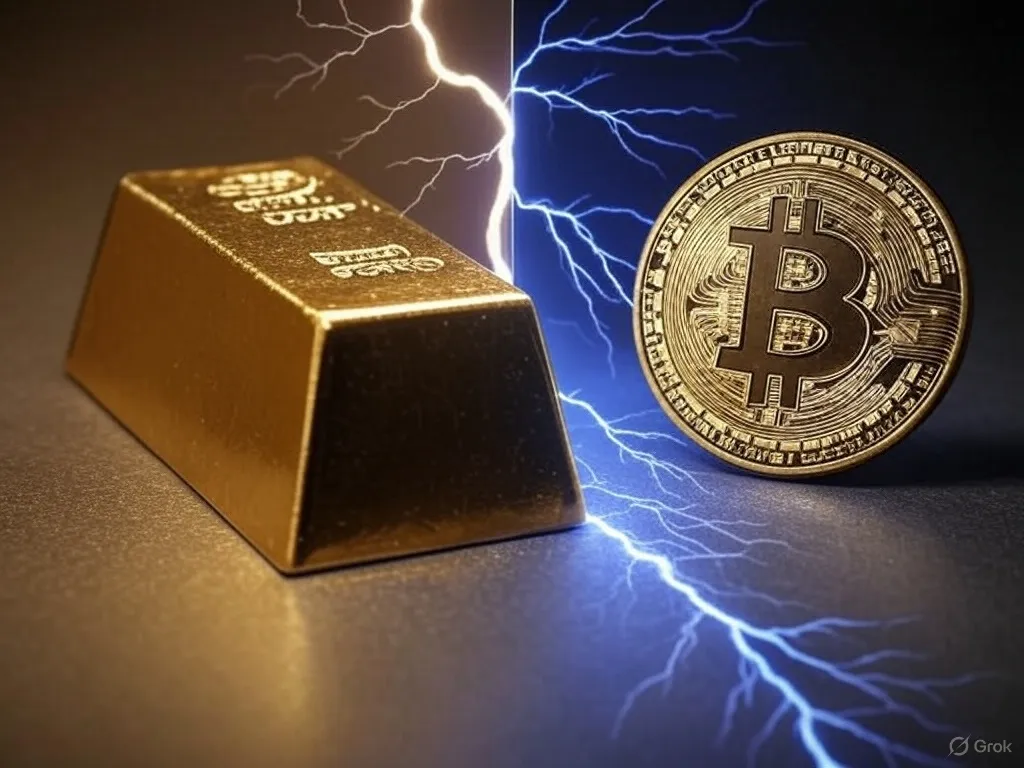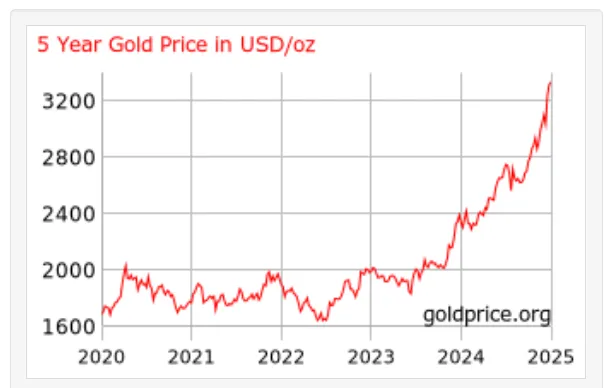With US national debt closing in on $37 trillion dollars, interest rates at 4.5%, inflation still running hot, and roughly $9 trillion set to be rolled over this year, many are coming to the realization that the global dollar system may be on its last legs.
The debate over which asset—Gold or Bitcoin—is more likely to preserve wealth in the event of a monetary reset, where traditional money ceases to exist, has persisted for over a decade, and is now back in the spotlight.
That will be the topic of today's article.

Gold
Let's acknowledge first what makes gold valuable:
Unlike Bitcoin, gold is a tangible commodity that is used in the manufacturing of electronics, jewelry, dental fillings, and more.
Gold has also been considered a Store of Value (SoV) for thousands of years. It has been used as money to barter for goods and services throughout the ages.
The perception of gold as a SoV was confirmed when Trump announced sweeping tariffs a few weeks ago, causing the financial markets to plummet.
As the stock market, bond market, and the dollar itself all sold off in unison, the price of gold surged higher and higher.
Since the end of 2023, an ounce of gold has climbed from $2000 all the way to $3500 - a sign that investors are nervous about something, and expecting gold to protect them.

What are some of the problems involved with using gold as a SoV?
The first problem is that gold is not easily divisible, nor transportable. For example, if you wanted to buy a $5 cup of coffee, you would have to shave off the exact amount of gold for the merchant. Also, carrying kilograms of gold with you while traveling is impractical.
We could use a system like E-Gold that allows you to spend your gold electronically, but that introduces a secondary problem.In a "shit hits the fan" monetary reset scenario, the custodian could flee with your gold, or the government could confiscate it "for the greater good". This is called counter-party risk, meaning that the gold is not truly yours unless you physically hold it.
We must consider too that our demographics are shifting. The gold-loving baby boomers are aging and set to be replaced by younger generations who are much more open to new ideas, such as using Bitcoin as money.
Also, recall that the horse and buggy was the primary mode of transportation for centuries until the automobile was invented. It usually takes a few decades for the population to fully adopt any new technology, and Bitcoin is no exception.
Bitcoin
Unlike gold, Bitcoin has no counter-party risk. Instead of being stored in a central location, Bitcoin is redundantly distributed over thousands of independently operated nodes, and only somebody with access to the private key of a wallet can spend any funds linked to it.
Transporting Bitcoin is a non-issue as well, because it is always in "the cloud" wherever you go. You can simply memorize your seed phrase and fly, drive, or walk across any border without an issue.

Bitcoin isn't perfect, however. Here are some common arguments made against it:
"What if the Internet or the electrical grid goes down" - While this would indeed stop you from spending Bitcoin, it would also prevent you from using an E-Gold-like solution, debit, or credit card. It may be worth carrying a small amount of silver with you for emergencies.
"What if the government bans it" - Chances are low that every single government worldwide, at both the federal and state level, would ban Bitcoin transactions. Also, the enforcement of such a ban is impossible with VPNs.
"It's not backed by anything" - An immutable database like Bitcoin has value because, unlike your bank account, it cannot be suspended or modified by a central authority. It is backed by energy, compute power, and a resilient community dedicated to success.
Gold bugs have also pointed out the fact that due to Bitcoin's 1MB block size it is limited to about seven on-chain transactions per second (TPS), preventing it from competing with the likes of Visa, who can process thousands of TPS during peak hours.
Crypto
Let's imagine a "shit hits the fan" situation in which everyone tries to withdraw their Bitcoin from exchanges at the same time. With the 1MB limit, the blocks would fill up fairly quickly, resulting in high fees and long delays for users.
Such a scenario would damage Bitcoin's reputation, and likely cause its market dominance to drop as users opted to withdraw into alternative, higher-capacity cryptocurrencies. In the process, they would become aware of crypto's other use-cases such as DeFi, DePIN, and RWA.
Another point to think about is that Bitcoin's primary use-case right now is the transfer of fiat currencies. In a monetary reset, where the value of the dollar hyperinflates or otherwise becomes irrelevant, would Bitcoin still be the most valuable cryptocurrency?
So long as they are sufficiently censorship-resistant, crypto tokens that represent real-world assets, allow you to participate in governance, or give you direct access to data, cellular service, WiFi, location data, computer power, and storage may be considered more valuable in the future.
Until next time...
Due to its manufacturing utility, gold will always retain some value. However, its role as an SoV is being challenged by cryptocurrencies like Bitcoin. As the younger generations start to take over, gold's role as an SoV will likely decrease relative to its digital competitors.
Bitcoin is the primary SoV contender, but one could argue that its stunted TPS has converted it into more of a speculative asset. Cryptocurrencies that underpin online and real-world economic activity may become the most valuable digital assets in the future.
If you found this article interesting, be sure to check out my other posts on crypto and finance here on the Hive blockchain. You can also follow me on InLeo for more frequent updates.
Further Reading
- Money Before And After The Gold Standard Was Abolished In 1971
- Issues Facing Tether's New Gold-Backed Stablecoin, And The Future Of RWA
- Will Compute Be The Most Valuable Commodity In The Future?